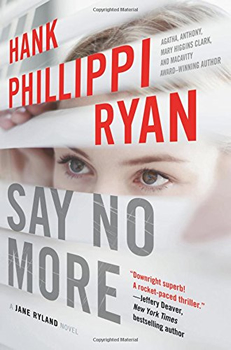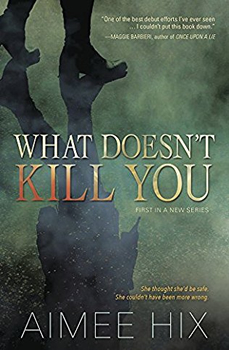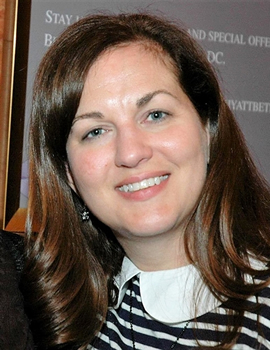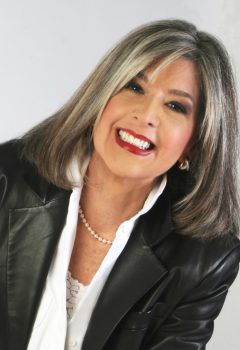

Debut Author Spotlight: Aimee Hix
I burst out laughing when I saw the cover and the title of Aimee Hix’s debut mystery/thriller, WHAT DOESN’T KILL YOU. First, laughing with joy at its very existence because Aimee has been a devoted crime fiction reader for as long as I’ve known her—10 years? She’s persevered, learned her craft, and been genuinely happy for her writer friends. Participated, contributed, empowered. She’s worked and edited and revised and paid her dues. I can only begin to tap into the happiness she must have felt seeing this—her debut novel! And the perfect cover. That’s a profound delight.
But laughing, too, because—Aimee? Is hilarious. Effortlessly funny. At every event, I follow the sound of the affectionate laughter, and Aimee is at the center of it.
And her title is so perfect. WHAT DOESN’T KILL YOU, of course, requires to you think: makes you stronger.
So I wondered—is that what Aimee’s life has been like, too? And guess what. Yes, it has.
Where did you grow up? What kind of a kid were you?
I grew up in Northern Virginia (where the book is set) and summered in Front Royal, Virginia (about 80 miles northwest of Northern Virginia). Of course, “summered” sounds fancier than “dumped off on my mother’s sister because summer camps were too difficult to track down.” I was a crazy, fearless child. Literally, the first one to say, “We should go into those woods the adults told us not to go into.” I had an emergency room file three inches thick before I was five—bicycle accidents, falling out of trees, jumping off high rocks/fences/porches/cows; cut, scraped, brambled, skewered, burned. I could go on but you get the point.
What doesn’t kill you, right? See, told you. Were you the troublemaker or the rule-follower?
I was both the troublemaker and rule-follower. I have layers. I’m the youngest of four kids by a gap of over 11 years. Neither of my parents were much interested in having kids but that was what you did back then. So I was on my own and responsible for getting myself up for school and getting lunches made, uniforms washed and ironed (I went to Catholic school because I was on scholarship), homework done. Catholic school probably wasn’t the best fit for a kid who liked rules and hated authority. (Again, layers.) I was the classic latchkey kid.
Do you remember when you fell in love with reading—or did you? Tell me about the books you loved as a kid—which were life—changing for you?
The library was my respite during the school year. It was close enough to walk to, even with a large stack of books (which I always had), and I devoured everything. So the books I loved were books. All of them.
I still remember the moment I realized I could read. It’s the first memory I have and it’s as clear as what happened to me an hour ago. I knew in that moment, and still believe, that those words on the page were more than a story about a chick hatching—they were power. I went through any printed materials. I would read anything. A hand-me-down set of encyclopedias, the dictionary, food boxes, the neighbor’s newspaper.
I always had a book. I went through the Laura Ingalls Wilder books, Island of the Blue Dolphins, Johnny Tremain, The Secret Garden. (And I still want to know why the hell all those late 70s/early 80s book for grade schoolers were SO. DAMN. DEPRESSING. It was like they wanted to rip hope away from an entire generation.)
I know. SO depressing! I think that’s supposed to introduce conflict. Or teach compassion, or confidence, or something. A Little Princess? What an upsetting book. I remember being so unhappy after I read it. I thought: why would someone write this? But a good mystery, where the smart kids prevailed? Where there was a big problem that the grownups couldn’t solve, but…
Exactly. It’s the oldest story for us mystery fans, right? Nancy Drew.
Right. When did you discover her? How did that happen?
My mother, or more likely my aunt, found a box of Nancy Drews at the flea market and got them for me for rainy summer days when my cousins (a boy two years older and another boy two years younger) and I could not play Monopoly without violence. (I’m pretty sure at least two emergency room visits are plastic-hotel-related.) We were adjourned to our bedrooms to read. And Nancy was adventure when out the window the mountainside was a rain-soaked, mud-crusted mess.
Yeah. I have to say, even though she’s just a bit annoying when you look back at her, at the time she was about the coolest ever.
I was about eight years old when someone asked me what I wanted to be when I grew up. I said Nancy Drew. Much laughter ensued. (All the adults I knew were assholes, apparently.) I was under the impression that Nancy Drew was a job. The coolest job in the world. Hannah making you lemon bars, your best pals hanging out, a boyfriend that you didn’t have to deal with (older sister boy drama cured me of any early interest in boys, that’s for sure. I mean, my older sister got married when I was 8, yuck), a sporty car you could drive as fast as you wanted, your scarf whipping in the wind jauntily behind you … WHO WOULDN’T WANT TO BE NANCY DREW?
Alas, Nancy Drew was not a job. Growing up in the DC Metro area I was well aware of the FBI even as a kid, though, because my other older sister babysat for a couple who were never home—he was with the FBI and she was a flight attendant. FBI agents got to be away from home. One of the few times I saw him—at a block party, I think—I asked him if it was like Nancy Drew and he said it was. See above re: WHO WOULDN’T WANT TO BE NANCY DREW?
Ever since I realized that books weren’t things that just were, that people made them, I had in my mind that I would be a writer at some point. I figured it would be after my career as Nancy Drew/FBI agent was over. Mostly, because my mother repeatedly told me that “writer is not a real job—you need a real job.” So after the Nancy Drew/FBI agent thing fell through because of my eyesight, I got a “real job” at a federal contractor and did that for 20 years.
Eyesight?
Yeah. My inability to pass the sight requirements was all that stopped me from lying about it on my FBI application. That and a deep aversion to federal prison.
Federal contractor? I am suspecting you were actually a spy.
I wish federal contractor was code for Sexy Spy. But it’s not. Not even with a wink. Sorry. It would be horrible code, though, because it begs the question, “What is a federal contractor?” And the reality is, it’s a company that the majority of its business is contracting jobs for the federal government. Some of it is classified and you have to have a clearance. Some of the work I did is classified—yes, the “I could tell you but then I’d have to kill you” type, but I don’t have any Sexy Spy gear to do the killing with. I’d probably just have to, like, give you a billion paper cuts.
Which is, indeed, a deterrent. Anyway. How does your family feel about your new non-spy career? (I know you weren’t really a spy. But it’s so Nancy Drewish.)
When I said to my husband, “I want to quit my day job and write full time,” I had finished but not revised WHAT DOESN’T KILL YOU. I hadn’t even seriously considered querying agents. I just knew I wanted to write. God love him, the man looked at me and said, “I’m in.” He’s my biggest cheerleader.
My daughter is Jewish-grandmother-proud of me. She will tell strangers, “My mom is a writer. Her first book comes out in January.” I am not even kidding. It’s hilarious, embarrassing, and so amazing.
 Where do you write? Is it difficult to find time to do it?
Where do you write? Is it difficult to find time to do it?
I write in lots of places. I have a home office, but most of the time, writing at the desk there feels like pulling teeth. WHAT DOESN’T KILL YOU was mostly written at one of the nearby libraries. I wrote about 60 percent of it in one specific chair at the library over the course of a three-week vacation I took from my day job specifically to write. (I wrote the whole book while I was employed.)
I wrote most of the second book, just delivered, sitting on my bed. I was sick for about six months straight and I’d take medication and wait for it to kick in and write until it wore off.
As precious as it sounds, where and how I write the books is kind of driven by the book. It lets me know where, when, and how it wants to be written.
Are you very disciplined? Wow. You must be.
I am, for the most part. I’ve heard it called Worshipping at the Church of a Thousand Words before. A thousand words, when I’m working to deadline, is my Must Accomplish. Two thousand is my stretch goal. My very best day, during NaNoWriMo 2011, was 7,000 words on Thanksgiving. The next day I wrote 4,500 more. I wish I could write like that every day. But laundry needs doing, food needs to be cooked, dogs need to be let in and out ad nauseum, family members need attention paid to them.
I truly remember the first time I met you. At Malice Domestic, right? And I heard this burst of laughter, and thought—oh, the fun people must be over there. Well, I was right. And you were in the center of it. As always! Is there a way you look at the world that elicits that consistently joyful response? Or are you the shy one who handles social events with humor?
Wow, that is such an amazing compliment. Thank you.
I am very much a serious, worried, anxious optimist (remember, I said I have layers). I spent a lot of time alone as a kid.
In fact, thinking about it, I was a weird kid who knew too many things that I shouldn’t. As a kid, I had a true photographic memory so all those books I read I remembered everything from them and could recall them at will. It made taking tests a breeze, but relating to other kids wasn’t my milieu. I was either the daredevil or the odd kid spouting facts about the Hindenburg disaster. No one knew what to do with me because I don’t really have a middle ground.
I’m either a zero or sixty person. I don’t own much “middle ground” or in-between space intellectually or socially.
Or maybe it’s more a “make them laugh before they laugh at you” thing—the class clown role just years and years later. Maybe it’s just the layers thing again.
Speaking of layers. Tell me about Willa Pennington. But wait—I love this part of the description of the gripping (yes, gripping) WHAT DOESN’T KILL YOU.
“Agreeing to do a simple favor has brought apprentice PI Willa Pennington to a dead body, a missing person, and a battle of wits with an old friend who has dangerous secrets. If Willa can keep her focus, she could solve the murder, find the missing girl, and figure out if the person she’s trusted with her life is the one trying to end it.”
(That is also kind of Nancy Drew-ish, in an emotionally sophisticated and much scarier way. I think we have a theme!) So where did she come from, and how much do you know about her?
Willa Pennington is the woman I wish I could have been at her age. Heck, she’s the woman I wish I could be now. She lives the axiom that being afraid and going ahead and doing it anyway is the best approach to life. And she was thrown for a loop when the thing she never thought would happen happened – she lost her best friend. Her external stoicism is a trait she and I share. I found that to be the most difficult and easiest quality of hers to bring to life. It’s something I work on, so I knew that it had to be her character arc—learning that being vulnerable is the ultimate act of bravery.
Did you always know you would write about Willa?
It’s the layers thing. Again. Willa started in a different story than the one she ended up in. I had the character and the plot working independently until she barged in and told me to quit screwing around with her in Wales and to get her to the Fairfax County story. Of course, I listened because she was right. Once that happened most of the rest of it fell into place. Except her name.
Huh?
Yeah. For more than half of the book I tried on different names for her and none fit. Most of the names I auditioned for her were androgynous like Charlie and Dannie—nicknames for both male and female names. Those seemed to suit her best. And then just like she told me she was in the wrong story initially, she whispered her name in my ear. She was right again.
Willa is the feminine form of William, and William means “valiant protector.” Also, it sounds like Willow, which calls to mind the ability to bend but not break during a storm. It works on many levels.
As for what I know about her? Everything. I know her history backward and forward. The more stories I write with her in them, the more I realize about her. I’m not learning it, I just know her. I find that comforting. Because for all the things I share with her, she and I are very different, and knowing her completely when I don’t always feel like I know myself that well means I have the ability to realize those parts of myself. Sorry, that’s a tricky answer.
I love how she’s outwardly tough, but inwardly, personally, so vulnerable.
Outwardly she does seem very tough. She’s more prone to action than reflection, which is not uncommon amongst police. Michael, her late best friend, was her decoder ring for the more reflective/emotional side of the world. Losing him leaves her at a great disadvantage. I love that their relationship bucks the stereotypes that women are more emotional and men are more stoic. Sadly, I always knew Michael was dead when we’re introduced to Willa. Willa and Michael came as a package deal from the wrong story where she started.
SO many books out there—what makes these special? (I know, but I want you to say so.)
I hope what makes these books special is Willa. She ticks so many boxes in the fictional detective category, but when I expect her to zig, she zags. Even though I know her as well as I know any real person, she surprises me with what she chooses to do.
There’s a reveal about her character in the second book that explains that part of her personality. Her history helps inform why she’s doing what she’s doing with her new “client” and, in turn, this client helps her learn more about herself. The emotional truth of that event in her history is something she and I share.
Oh, that’s mysterious. Can you tell us more? Or is that a spoiler?
Not really a spoiler but I’m not giving away the specifics either. Mostly because I don’t know what my editor even thinks of the book yet since I just turned it in. Really, the moment is about accepting that we don’t always get what we want or what we need from people, even our parents, and that accepting that as truth and even forgiving them doesn’t mean that you’re “fixed” or even that you’re supposed to be “fixed.” Expectation, of which I am a big ole addict, is the cause of all the pain we have in our interactions with other people. There’s a fine line between not trusting and not trusting too much. We don’t always learn that at the times it’s convenient or timely.
Your unique voice comes through so strongly in this book. When you describe the book, what do you say?
Unfortunately for my publisher, who has to market the books, I feel like the books aren’t easily defined as straight mysteries. I consider them thrilling mysteries, riding the edge between the elements of both traditional mysteries and thrillers. It’s not something I set out to do on purpose. Willa is the driving force behind how the stories come together and that’s how she does business.
She wants to do the right thing, but…
She is someone for whom “doing the right thing” is situational. And when she finds that people she cares about are in trouble or hurting she can’t let the official rules or legalities dissuade her. Her neighbors are good people, kind people who she’s known since she was a child. She isn’t supposed to help them, but helping is the right thing to do even if it’s not the Right Thing. Then, as life often does, she’s thrown a curve ball that brings up her worst pain. But she keeps putting one foot in front of another, trying to find this missing young woman, trying to ensure that her neighbors get what they need. And, in the process, figure out her own way to move on after the loss she’s suffered.
Has writing mysteries made reading them a different kind of enterprise?
Yes and no. I’ve found that no matter what genre of fiction book I’m reading now, I have a tendency to deconstruct the story, writing style, elements, etc., to see how it’s put together like I imagine a beginning illusionist watches to see how the tricks are put together. I have to remind myself to just sit back and enjoy the story when I’m reading for pleasure. Easier said than done, and I’ve started picking apart movies now too.
So when people read WHAT DOESN’T KILL YOU for pleasure—and they will! – what do you hope they think when they close the book?
Mostly, I hope that people take away how much I admire the character of Willa, which seems self-congratulatory, I know, but Willa has never been a character I’ve created. I’ve always felt like I’m telling the world her story; in a way I’m her Michael … being the decoder ring to explain her to the world.
Oh, that’s so wonderful, Aimee. What a perfect way to explain what we all do. And congratulations!
*****
An inability to pass the sight requirements and a deep aversion to federal prison prevented Aimee Hix from lying on her FBI application so she set her deficient eyes on what most Northern Virginians do for work—the non-law enforcement side of the federal government.
After twenty years as a federal contractor, she retired and turned to murder. Fictionally, of course. Aimee lives in Virginia enjoying LASIK-corrected eyesight with her family, two dogs, and all her killer thoughts.
To learn more about Aimee, please visit her website.
Hank Phillippi Ryan is the on-air investigative reporter for Boston’s WHDH-TV, winning 34 EMMYs and dozens more journalism honors. Nationally bestselling author of nine thrillers, Ryan’s also an award-winner in her second profession—with five Agathas, two Anthonys, two Macavitys, the Daphne, and Mary Higgins Clark Award. Critics call her a “superb and gifted storyteller” and a “master of suspense.” Her novels are in Library Journal’s Best of 2014, 2015, and 2016. Her SAY NO MORE is also a Mary Higgins Clark, Daphne, and Agatha Award nominee. Hank is a founder of MWA University and 2013 president of National Sisters in Crime. Watch for her standalone psychological thriller TRUST ME in 2018.
To learn more about Hank, please visit her website.
- LAST GIRL MISSING with K.L. Murphy - July 25, 2024
- CHILD OF DUST with Yigal Zur - July 25, 2024
- THE RAVENWOOD CONSPIRACY with Michael Siverling - July 19, 2024



